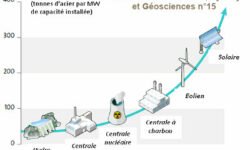Category: Offre poste pourvue
M2 Internship: Technological dependencies

The objective of this internship is to facilitate the development of alternative approaches to the organisation of the production and consumption of goods and services that are aligned with planetary limits and whose organisational choices can be collectively determined through democratic processes.In light of the aforementioned considerations, this internship topic…
M2 Internship: Energy and environmental footprints of agricultural sectors in France and the regions

Context The SCALABLE research project is funded by ADEME and involves the LESSEM laboratory (INRAE Grenoble), the STEEP team at Inria Grenoble, Auvergne-Rhône-Alpes Énergie Environnement, the TerriFlux company, and the territories participating in the Greater Grenoble Inter-Territorial Food Project. The SCALABLE project focuses on biomass of agricultural origin (BOA) at…
PhD thesis: Systemic vulnerability of the socio-economic metabolisms of territories

Concept de vulnérabilité métabolique Le concept de “vulnérabilité métabolique”, récemment introduit par (Bahers et al., 2019), prolonge celui de “vulnérabilité environnementale”. Si les travaux se référant à la vulnérabilité environnementale (Mathis et al., 2016) s’attachent à interroger les dispositions d’une société à être plus ou moins bien préparée à supporter…
PhD thesis: Absolute environmental assessment of a territory’s socio-technical activities with regard to the concept of Planetary Limits

1 Background and scientific issues Environment and Planetary Boundaries – LP Post-industrial human societies have become a force that can alter planetary boundaries: Climate change ; Biosphere integrity ; Soil denaturation ; Disruption of the nitrogen and phosphorus cycles ; Overexploitation of fresh water ; Atmospheric aerosol load ; Ocean…
PhD thesis: Relocation of productive activities: multi-scale modeling based on graphs and constraints
PhD thesis: Systemic analysis of energy transition scenarios under resource flow constraints: risks and feasibility

Context Scientific and social context The issue of energy transition is a key political issue at national and international level in the fight against climate change, and various national and international agencies, think tanks and NGOs have put forward energy transition scenarios. The vast majority of these scenarios focus on…
M2 Internship: Assessing the credibility of energy transition scenarios up to 2050 inregard to energy, material and environmental combined constraints?

Subject The world is at the dawn of a possible energy transition unprecedented in the history of humanity. The necessity to shift from fossils fuels—being in the meantime the source of today’s wealth and the cause of climate change—to low-carbon energies seems indisputable. However, the feasibility of existing transition scenarios…
M1 / M2 / engineering internship: systemic assessment of a territory

The STEEP team is interested in the problem of systemic risks generated by planetary limits and applied to territories. The team models socio-technical alternatives to inform the choices made by stakeholders in each region when defining scenarios for sustainable societies that take better account of these planetary limits. As part…
M2 Internship: Multiscale issues in relocation

Context Lopez-Ridaura et al (2005) propose a formal framework, based on linear programming, for analysing the trade-offs involved in multi-scale, multi-criteria problems. The method involves optimising a given indicator at a given scale under the constraints of other indicators. We then look at what we gain and what we lose…
M2 Internship: Technological dependencies

The objective of this internship is to facilitate the development of alternative approaches to the organisation of the production and consumption of goods and services that are aligned with planetary limits and whose organisational choices can be collectively determined through democratic processes.In light of the aforementioned considerations, this internship topic…
M2 Internship: Energy and environmental footprints of agricultural sectors in France and the regions

Context The SCALABLE research project is funded by ADEME and involves the LESSEM laboratory (INRAE Grenoble), the STEEP team at Inria Grenoble, Auvergne-Rhône-Alpes Énergie Environnement, the TerriFlux company, and the territories participating in the Greater Grenoble Inter-Territorial Food Project. The SCALABLE project focuses on biomass of agricultural origin (BOA) at…
PhD thesis: Systemic vulnerability of the socio-economic metabolisms of territories

Concept de vulnérabilité métabolique Le concept de “vulnérabilité métabolique”, récemment introduit par (Bahers et al., 2019), prolonge celui de “vulnérabilité environnementale”. Si les travaux se référant à la vulnérabilité environnementale (Mathis et al., 2016) s’attachent à interroger les dispositions d’une société à être plus ou moins bien préparée à supporter…
PhD thesis: Absolute environmental assessment of a territory’s socio-technical activities with regard to the concept of Planetary Limits

1 Background and scientific issues Environment and Planetary Boundaries – LP Post-industrial human societies have become a force that can alter planetary boundaries: Climate change ; Biosphere integrity ; Soil denaturation ; Disruption of the nitrogen and phosphorus cycles ; Overexploitation of fresh water ; Atmospheric aerosol load ; Ocean…
PhD thesis: Relocation of productive activities: multi-scale modeling based on graphs and constraints
PhD thesis: Systemic analysis of energy transition scenarios under resource flow constraints: risks and feasibility

Context Scientific and social context The issue of energy transition is a key political issue at national and international level in the fight against climate change, and various national and international agencies, think tanks and NGOs have put forward energy transition scenarios. The vast majority of these scenarios focus on…
M2 Internship: Assessing the credibility of energy transition scenarios up to 2050 inregard to energy, material and environmental combined constraints?

Subject The world is at the dawn of a possible energy transition unprecedented in the history of humanity. The necessity to shift from fossils fuels—being in the meantime the source of today’s wealth and the cause of climate change—to low-carbon energies seems indisputable. However, the feasibility of existing transition scenarios…
M1 / M2 / engineering internship: systemic assessment of a territory

The STEEP team is interested in the problem of systemic risks generated by planetary limits and applied to territories. The team models socio-technical alternatives to inform the choices made by stakeholders in each region when defining scenarios for sustainable societies that take better account of these planetary limits. As part…
M2 Internship: Multiscale issues in relocation

Context Lopez-Ridaura et al (2005) propose a formal framework, based on linear programming, for analysing the trade-offs involved in multi-scale, multi-criteria problems. The method involves optimising a given indicator at a given scale under the constraints of other indicators. We then look at what we gain and what we lose…




